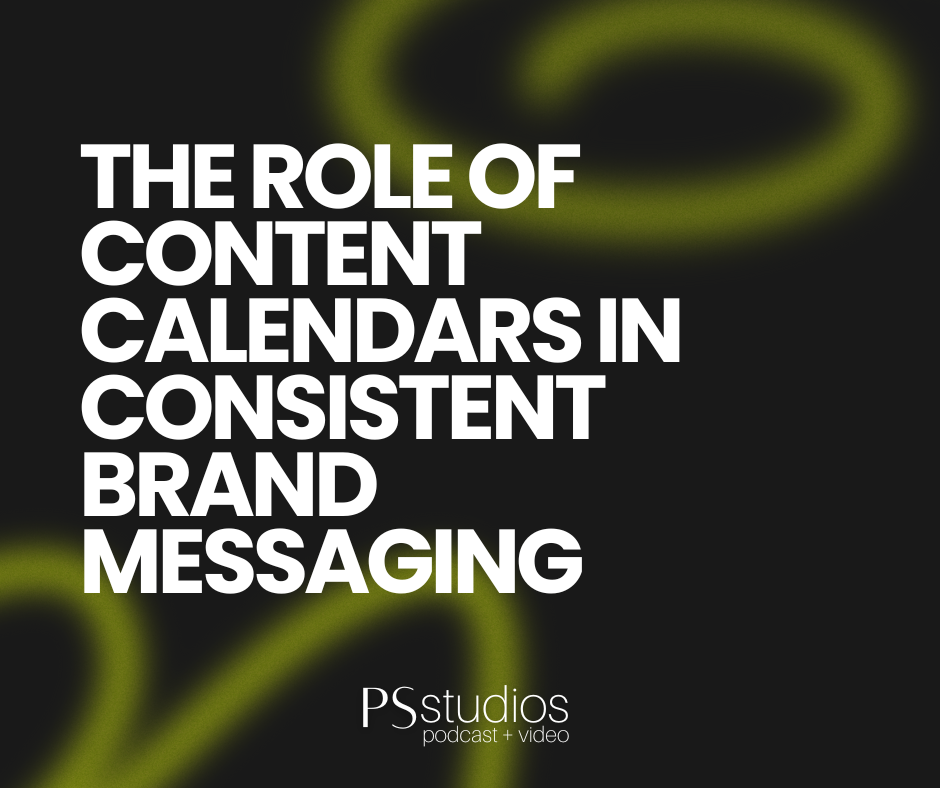
The Role of Content Calendars in Consistent Brand Messaging
If you want to build a strong brand, consistency isn’t just helpful—it’s critical. One of the most powerful tools for maintaining consistency across all your platforms is a content calendar. It helps you stay organized, plan ahead, and ensure every piece of content supports your larger brand message.
At PS Studios, we work with creators, companies, and podcast hosts to build production timelines that align strategy with execution. Here’s how a content calendar can help keep your message sharp, your content consistent, and your audience engaged.
The Role of Content Calendars in Consistent Brand Messaging Across Platforms
Whether you’re producing podcasts, video interviews, or social media clips, your audience expects reliable, on-brand content. Incorporating important dates into your content calendar enhances relevance and timeliness. A content calendar ensures you’re not scrambling for ideas—or posting off-message. A brainstorming session plays a crucial role in generating and organizing content ideas collaboratively. Instead, you’re publishing with purpose, every time.
1.1 Introduction to Content Calendars
In the fast-paced digital marketing world, staying organized and maintaining consistency across multiple platforms is crucial. A content calendar is an indispensable tool that helps businesses achieve these goals. By utilizing a content calendar, companies can align their content strategy with their business goals, ensuring that every piece of content serves a purpose. This not only boosts engagement but also strengthens the brand’s presence. In this section, we will delve into the importance of content calendars and how they can streamline the content creation process, making it easier to stay organized and focused on your business objectives.
1.2 What is a Content Calendar?
A content calendar, often referred to as an editorial calendar, is essentially a written schedule that outlines when and where to publish upcoming content. It includes details about upcoming pieces, status updates, planned promotional activities, partnerships, and updates to existing content. Planning content using publication dates helps create a content calendar that visualizes future articles and spreads out publication dates to maintain flexibility and ensure brand consistency across posts. By planning and organizing content in advance, businesses can ensure they consistently deliver high-quality content to their target audience. This is particularly vital for social media management, as it allows companies to schedule posts and maintain a consistent tone across all social media platforms, thereby keeping the audience engaged and informed.
1.3 Benefits of Using a Content Calendar
The advantages of using a content calendar are manifold. Firstly, it helps businesses stay organized, ensuring that all team members are on the same page and working towards common goals, ultimately creating high-quality content. A content calendar also facilitates strategic planning, enabling companies to plan their content in advance and execute a more effective content marketing strategy. Consistency is key to building a strong brand identity and engaging with the target audience, and a content calendar helps maintain this consistency. Additionally, it allows businesses to track their progress and performance, making it easier to identify areas for improvement and adjust their strategy accordingly. By using a content calendar, businesses can ensure that their content marketing efforts are both efficient and effective.
2. Align Content Strategy with Campaigns and Goals
Are you launching a new product? Promoting an event? Wanting to educate your audience? A content calendar helps you line up your content with your marketing goals, making sure every video, post, or podcast plays a part in the bigger picture. Creating content collaboratively within a team ensures smooth communication and management of promotional activities that align with the editorial schedule. Incorporating company milestones and product launches into your content calendar ensures relevant and timely content creation, aligning with your overall marketing strategy. Regular blog posts foster audience engagement, support brand consistency, and provide valuable insights for content planning.
2.1 Using a Content Calendar Tool
There are numerous content calendar tools available, ranging from simple spreadsheets like Google Sheets to more sophisticated social media management platforms like Sprout Social. When selecting a content calendar tool, it’s essential to consider the team’s size, workflow, and specific needs, as different tools may cater to varying group sizes and workflows. The tool should be user-friendly, customizable, and facilitate cross-team collaboration. Popular content calendar tools include Google Calendar, Trello, and Asana. By leveraging these tools, businesses can streamline their content creation process, ensuring that all team members are working together efficiently and effectively to produce high-quality content.
2.2 Using a Content Calendar Template
A content calendar template can be an excellent starting point for businesses looking to create their own content calendar. These templates can be found online or created using a spreadsheet or document. A well-designed content calendar template should include columns for the date, content type, channel, and status, along with any other relevant information. Using a content calendar template can save time and ensure that the calendar is well-organized and easy to use. It also helps in organizing new content, ensuring a consistent flow of fresh material that keeps your audience engaged. It’s also important to regularly review and update the template to ensure it continues to meet the company’s evolving needs and goals. This practice will help keep the content calendar fresh and relevant, ultimately leading to a more effective content marketing strategy.
3. Content Planning and Ideas
Content planning is a crucial part of any successful marketing strategy. It involves creating a content calendar that outlines when and where to publish upcoming content. A well-structured content calendar helps plan and organize content in advance, ensuring that the target audience is consistently engaged. To fill a content calendar with great ideas, brainstorming sessions can be held to generate a list of potential topics. These sessions are a fun part of the content creation process, allowing teams to explore various content types and formats.
Keyword research is also essential to ensure that the ideas resonate with the target audience and boost SEO efforts. By using relevant tools such as Google Keyword Planner, Ahrefs, or SEMrush, businesses can choose the right keywords and decode crucial keyword metrics such as search volume, competition, and relevance. This strategic planning ensures that the content not only engages the audience but also ranks well in search engines, driving more traffic to the brand’s platforms.
3. Maintain a Balanced Mix of Content Types
With a calendar view, it’s easy to see if you’re leaning too hard on one type of content (like promotions) and neglecting others (like education or storytelling). Optimizing website content through web personalization features is crucial as it adapts to visitor behavior and preferences, enhancing user experience. A strong calendar includes different types of content—long-form video, short clips, graphics, and audio content—to keep your audience engaged with relevant content. Stakeholders can easily view planned content and provide feedback, ensuring collaboration and consistency.
5. Content Marketing and Distribution
Content marketing is a key component of any digital marketing strategy. It involves creating and distributing high-quality, relevant, and valuable content to attract and retain a clearly defined target audience. A content calendar is essential for content marketing, as it helps to plan and organize content in advance, ensuring that it is consistently published across multiple platforms. By using a social media management platform, businesses can schedule posts in advance, ensuring that their audience is consistently engaged.
Additionally, content calendars can help businesses maintain consistency in their content creation process, ensuring that their brand is consistently represented across all social media platforms. This consistency is crucial for building a strong brand identity and fostering trust with the audience. By strategically planning the distribution of content, businesses can maximize their reach and impact, driving better results from their content marketing efforts.
4. Improve Team Collaboration
If you’re working with multiple contributors, a calendar gives everyone visibility. Strategically timing the sharing of content across multiple channels can maximize engagement and ensure a balanced approach between frequency and quality. From content creators to editors and marketing leads, everyone knows what’s coming, when it’s due, and how it fits into the larger strategy. Effective planning and communication among teams can enhance content quality, streamline approval workflows, and ensure alignment across marketing strategies and brand messaging.
5. Make Space for Real-Time Flexibility
Believe it or not, a good content calendar makes you more adaptable. Content planning is a crucial part of any successful marketing campaign. With core content pre-planned, you can react to trending topics or timely opportunities without sacrificing consistency. Understanding which types of content resonate with the audience’s preferences is essential. Think of it as a safety net—not a straitjacket.
6. Schedule Your Production with Confidence
At PS Studios, we help you build and execute a content calendar that aligns with your recording schedule. Including industry news as a key component in your content strategy is crucial for keeping your audience informed and interested. Whether you batch record in-studio or mix in remote interviews, we support your strategy from concept to release. Effective content strategies can foster deeper connections with your target audience, driving interaction and loyalty.
Additionally, retargeting email subscribers with personalized content can enhance engagement and ensure a cohesive content strategy.
9. Measuring and Optimizing Performance
Measuring and optimizing performance is a crucial part of any content marketing strategy. By using analytics tools, businesses can track the performance of their content, identifying what works and what doesn’t. This information can then be used to optimize future content, ensuring that it resonates with the target audience and achieves the desired marketing goals. A content calendar can help businesses track their performance, identifying important dates and trending topics that can be used to boost engagement.
By staying organized and using the right tools, businesses can ensure that their content is consistently high-quality and engaging, driving real results for their business. Regularly reviewing and adjusting the content strategy based on performance metrics helps in maintaining relevance and effectiveness, ensuring that the marketing efforts are always aligned with the business goals.
10. Content Calendars and Brand Consistency
Content calendars are essential for maintaining brand consistency. By planning and organizing content in advance, businesses can ensure that their brand is consistently represented across all social media platforms. A content calendar helps to maintain consistency in the content creation process, ensuring that the target audience is consistently engaged. By using a style guide and ensuring that all team members are on the same page, businesses can ensure that their brand is consistently represented, building trust and credibility with their audience.
A content calendar is a crucial part of any marketing strategy, helping businesses stay organized and ensure that their content is consistently high-quality and engaging. This organized approach not only enhances the brand’s image but also fosters a deeper connection with the audience, driving long-term loyalty and engagement.
Let’s Bring Order to Your Content Creationx
Interested in starting a podcast or upleveling your existing show? Schedule your free discovery call with our expert production team at PS Studios. Setting clear marketing goals, including the objective to boost engagement, is crucial for developing an effective content strategy. During this call, we’ll discuss your goals, timeline, and how we can help. We work with clientele across the country and look forward to chatting with you! Brands should research and incorporate relevant hashtags, keywords, and topics that engage their audience to enhance content planning and outreach.


